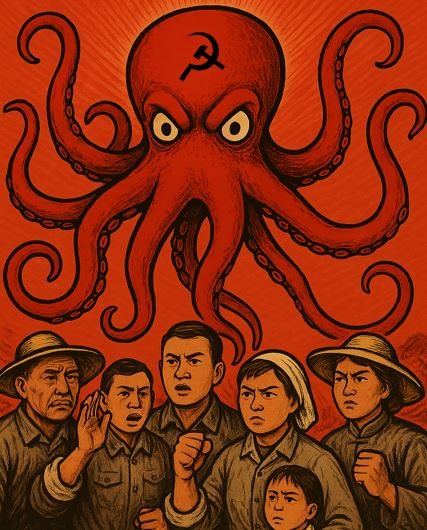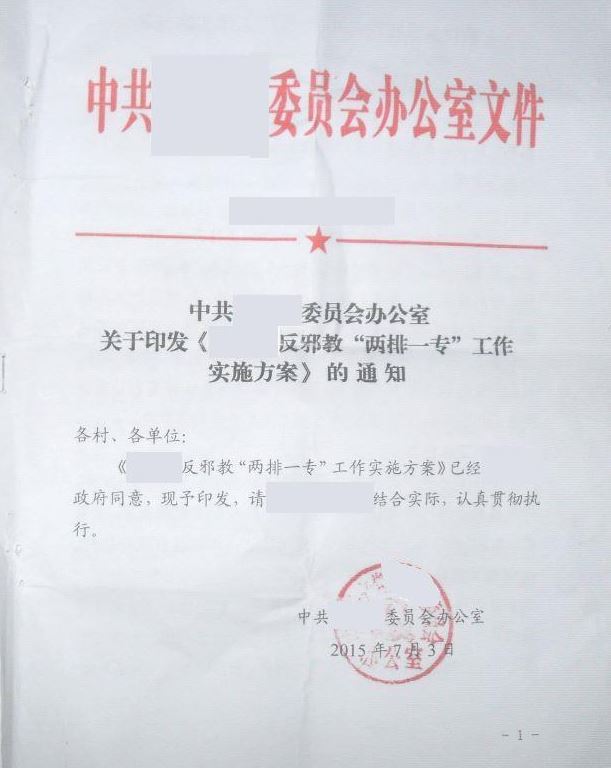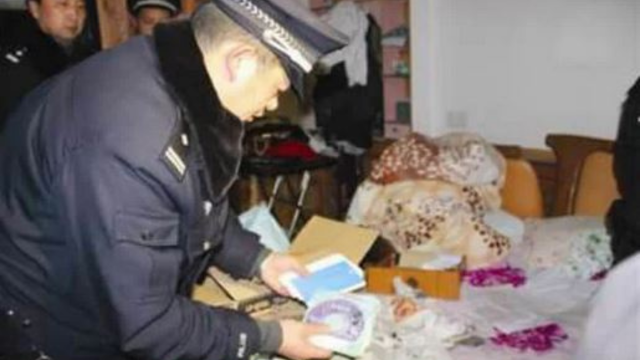A report on the seven methods used by the Chinese Communist Party to harass members of the persecuted Christian new religious movement abroad.
Article 1 of 5.

In recent years, the Chinese Communist Party (CCP) has adopted a systematic approach to transnational repression targeting The Church of Almighty God (CAG) abroad. Increasing evidence shows that the CCP’s persecution of the CAG has been consistently extending to multiple countries. This paper gathers evidence from media reports and internal CCP documents and details seven primary methods used by the CCP to implement transnational repression against CAG members. It provides representative case studies of persecuted members. Its goal is to document and present evidence to enhance understanding of the CCP’s illegal repression activities overseas. For most individual cases, we have used pseudonyms for security reasons. “Bitter Winter” has seen documents and heard testimonies of all cases mentioned, and is persuaded that they have been reported faithfully.
Background
The CAG is mainland China’s fastest-growing Christian new religious movement. Since it began in the 1990s, it has endured relentless suppression and persecution by the CCP authorities. In 1995, to justify its crackdown, the CCP labeled the CAG, along with other Christian movements like the Shouters and the All Ranges Church, as a “xie jiao,” a prohibited “movement spreading heterodox teachings” (sometimes translated, less correctly, as “evil cult”). Since then, the CCP has carried out a prolonged, systematic campaign of violent suppression against the CAG. At least 293 CAG members have reportedly died due to persecution. Between 2011 and 2024, nearly 480,000 CAG members were arrested by CCP authorities. Following some members’ exile abroad, the CCP launched further repression targeting these fleeing CAG members and overseas church communities, issuing multiple classified directives.
In 2015, the CCP’s internal document “Anti-Xie Jiao: Two Investigations, One Special Project Work Implementation Plan” called for a thorough investigation into overseas CAG members. It emphasized analyzing each case individually and developing customized strategies. The gathered data encompassed personal ID details, activities abroad, and the backgrounds of their relatives in China.

In 2019, the CCP document titled “Notice on Conducting Research on Topics such as the Dangers and Countermeasures Concerning the ‘Almighty God’ Xie Jiao Organization” indicated that the campaign against overseas CAG communities had been active for over ten years.
In September 2020, the CCP Central Political and Legal Affairs Commission issued a secret directive to initiate a three-year nationwide “General Battle” against the CAG. One of the campaign’s main goals was to limit the CAG’s growth overseas.
In 2018, an internal CCP document directed relevant departments to oversee online activities of CAG communities both inside China and internationally. It specifically called for domestic personnel to criticize and create discord among key overseas members. Another document highlighted the need to step up efforts targeting CAG abroad, requiring the collection of internal church information and data on key personnel, while employing infiltration, division, and suppression tactics.
In August 2023, the CCP’s Central Political and Legal Affairs Commission issued a classified directive to kick off a three-year “Tough Battle” against the CAG starting in 2024. The directive tasked the Ministry of State Security and Public Security with creating specialized operational plans focused on CAG communities overseas. It stressed increasing intelligence efforts, intensifying surveillance of key overseas church devotees’ homes and movements, and taking actions to “strike and dismantle overseas CAG groups and intimidate core members, limit their development, and weaken their operational capacity.” Additionally, it called on the Ministry of Foreign Affairs and Chinese embassies and consulates to “improve research and response strategies in important countries like South Korea and the Philippines” to hinder CAG’s overseas growth.
In 2024, several internal CCP documents showed that local authorities issued “Overseas Investigation Data Collection Forms” aimed at CAG members. Public security agencies were instructed to boost overseas reconnaissance, “conduct investigations in crucial foreign regions and countries,” and leverage big data technologies to detect communication patterns among members inside and outside China.
According to the report “Out of Sight, Not Out of Reach” by the international human rights organization Freedom House, China is currently the most widespread and advanced attacker of transnational repression. Its campaign stands out due to its extensive reach, global presence, and diverse tactics.

Tentacle 1: Coercion Through Family Members in China to Force CAG Members to Return
Case 1: Yan Simeng (Italy)
Yan Simeng (pseudonym) fled to Italy in September 2023 seeking asylum. Between March and July 2024, CCP police repeatedly contacted her brother, showing him surveillance footage of Yan changing trains multiple times before leaving China, to pressure him into convincing her to return. In July, officers from the provincial Public Security Department called Yan’s brother numerous times, alleging she was engaged in religious activities abroad. They demanded he pass on a message instructing her to return to China within a week and to renounce her faith. They threatened that if she refused, her household registration (hukou) would be revoked, implying she would be arrested upon reentry and face a potentially lengthy prison sentence. They also warned she could be “imprisoned for life,” and that her children would be prevented from taking college entrance exams, joining the military, or taking civil service exams. Additionally, they threatened to cancel her parents’ pension benefits.
Yan Simeng’s photo has since been posted on the Chinese “Anti-Almighty God Alliance” website.

Case 2: Sun Jinlang (France)
In 2015, Sun Jinlang fled to France. Over the following two years, he contacted his sister in China twice through QQ, a Chinese social media platform. Concerned about CCP monitoring of online chats, their discussions remained on typical family topics. Nevertheless, Sun soon became a target of Chinese public security authorities.
In 2017, officials from the Ministry of State Security repeatedly reached out to Sun’s sister, insisting that “Chinese citizens can only believe in the Communist Party.” They claimed Sun Jinlang was preaching abroad, claiming full awareness of his activities. They spread intimidating rumors, saying many had been deported to China or even beaten to death by foreigners. The authorities also asked her to cooperate by traveling to France to bring Sun back, offering to cover half the costs. When she declined, they threatened to impose restrictions preventing Sun from reentering China.
After realizing State Security forces had identified him, Sun cut off all contact with his sister.
Case 3: Tong Zhou (South Korea)
In 2018, Tong Zhou (a pseudonym) had her mother detained in Xinjiang due to her religious beliefs. While in custody, she was subjected to torture that resulted in acute kidney failure. The hospital issued a critical condition notice, and she was moved to intensive care, where she underwent 102 hours of continuous dialysis. Her weight decreased from sixty kilograms to forty in just over two months.
While she was hospitalized, police used evidence of Tong Zhou’s religious activities in South Korea, including her resume, to intimidate her mother. They warned that after Tong’s passport expired, she would be forcibly returned from South Korea.
Other Cases
Many similar cases exist. For instance, CAG members like Li Chao (pseudonym) in Italy, Gao Ziming (pseudonym) in South Korea, and Zhang Xing (pseudonym) in Canada have all experienced their families in China facing repeated police visits, interrogations, threats, and intimidation. Out of concern that their families could be implicated, many CAG members who have emigrated abroad have severed all contact with loved ones. They remain vigilant, worried that CCP agents or informants might obtain their personal information.
Source: Bitter Winter












